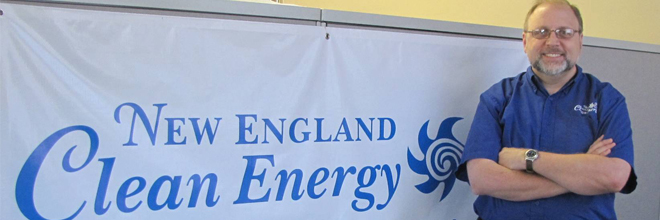Originally published as a guest blog post on Independent We Stand. Reprinted with permission.
The main way that buying local benefits the environment is straightforward: a shorter distance between consumers and local businesses means less transportation-related pollution. Answering these questions when considering a local business could further boost the environmental advantages of buying local:
- Does the local business grow, manufacture or source its own products locally? Or, is your new screwdriver or honeydew melon trailing carbon monoxide behind it? At New England Clean Energy, a solar energy installer, we buy from local vendors with competitive (not necessarily the lowest) prices, when feasible. Solar photovoltaic panels, our main product, aren’t available locally, so we buy those in bulk to minimize deliveries.
- Does the local business operate sustainably? Our fleet includes hybrids and we group visits to customers and prospects by location to reduce travel. All of our employees live locally and several people bike to work, which reduces our commuting emissions. Our office is powered down to 40 watts at night (for one phone), and we recycle everything humanly possible. Most significant, we don’t accept jobs more than a one-hour drive or so from our office. We actually send potential customers from outside our region to other installers.
- Is environmental commitment represented in the company’s strategy? For us, proximity to customers is not just a convenience or a whim. Unlike businesses that institute social responsibility plans after-the-fact, New England Clean Energy committed to minimizing our carbon footprint when we formulated our first business strategy in 2006. We don’t want to be a multi-million-dollar, multi-state company. I started New England Clean Energy to help the environment and make a living, not a killing. We want to provide the absolute best value to our customers in a well-defined market. That doesn’t require spending hours on the road, sometimes in traffic, spewing emissions into the air.
Some would call this strategy short-sighted and growth-limiting. But in the relatively new world of solar energy, this approach actually offers our business an advantage: Customers want their installer to be around down the road – literally and figuratively – to answer questions and solve problems.
Occasionally, we veer from our self-imposed geographic restriction, to serve a customer. A woman in Boston was so eager to install solar on her home that she cancelled a cruise and earmarked the money for solar. Imagine her disappointment when several companies said no because her roof was too small and oddly shaped. Someone making that kind of sacrifice deserves special treatment, so we drove a little farther than usual to install an 8-panel system on her home. Sometimes being the “local company” isn’t about proximity at all, but about attitude and willingness to help.
So if you want to add “helping the environment” to the good created by “buying local,” look beyond the local storefront and find out where these companies buy their products, and what environmental ethics are ingrained in their business strategy and operations. In particular, for service providers, find out how far they travel to serve customers. And if the local company you’re buying from sells an environmentally responsible product like solar energy, then congratulations, you’ve achieved the greatest environmental bang-for-your-local-buck possible.
If you liked this article, you might also enjoy:
- Tree Math 2: Solar vs. Trees, What’s the Carbon Trade-off?
- Minimizing Our Carbon Footprint on the Road
- Putting Renewable Energy Costs in Perspective






No comments yet. You should be kind and add one!
The comments are closed.